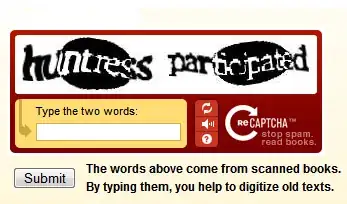Yes, and ReCaptcha have always been open about it, before and after being acquired by Google.
From its formation, one of ReCaptcha's main selling points was that the data would be used. At first, it was used for fixing errors and ambiguities in the digitisation of books. Here's an example of this being praised back in 2007, 2 years before Google acquired it, when ReCaptcha was new:
reCaptcha makes captchas more useful than just preventing spam; by tapping into the reportedly 150.000 hours spent daily typing in captchas, reCaptcha has users proofread book text that OCR could not recognize and which would otherwise have to farmed out to a Mechanical Turk or other distributed proofreader. ...reCaptcha’s ingeniousness lies in making an otherwise cumbersome task worthwhile
Today (2016), it's expanded to include improving maps, machine learning/AI, and possibly other uses. Google are open about this, and even have a gallery of examples of how recaptcha data is used: https://www.google.com/recaptcha/intro/index.html#creation-of-value
Millions of CAPTCHAs are solved by people every day. reCAPTCHA makes positive use of this human effort by channeling the time spent solving CAPTCHAs into digitizing text, annotating images, and building machine learning datasets. This in turn helps preserve books, improve maps, and solve hard AI problems.
Google were also open about this back when they first acquired it. In fact, at the time, not only did their slogan reference how the data was used, but the tool itself also explicitly stated it:
reCAPTCHA. Stop spam, read books.
The words above come from scanned books. By typing them, you help to digitize old texts.

Screenshot from this blog
They promoted the product as a form of "crowdsourcing", using labour people were giving freely anyway on existing captcha systems to do something useful. For example, from the official blog post by Google from 2009 announcing the acquisition:
Since computers have trouble reading squiggly words like these, CAPTCHAs are designed to allow humans in but prevent malicious programs from scalping tickets or obtain millions of email accounts for spamming. But there’s a twist — the words in many of the CAPTCHAs provided by reCAPTCHA come from scanned archival newspapers and old books. Computers find it hard to recognize these words because the ink and paper have degraded over time, but by typing them in as a CAPTCHA, crowds teach computers to read the scanned text.
In this way, reCAPTCHA’s unique technology improves the process that converts scanned images into plain text, known as Optical Character Recognition (OCR). This technology also powers large scale text scanning projects like Google Books and Google News Archive Search.
Whether or not that's efficiency or exploitation, smart or immoral, is subjective - but there's never been any doubt or secrecy about the fact it happens.
[edit] of course, with some of the challenges coming from "text" software had failed to identify, there's always the possibility it might be unreasonably difficult or not even text at all. With thanks to Mateo's comment:


